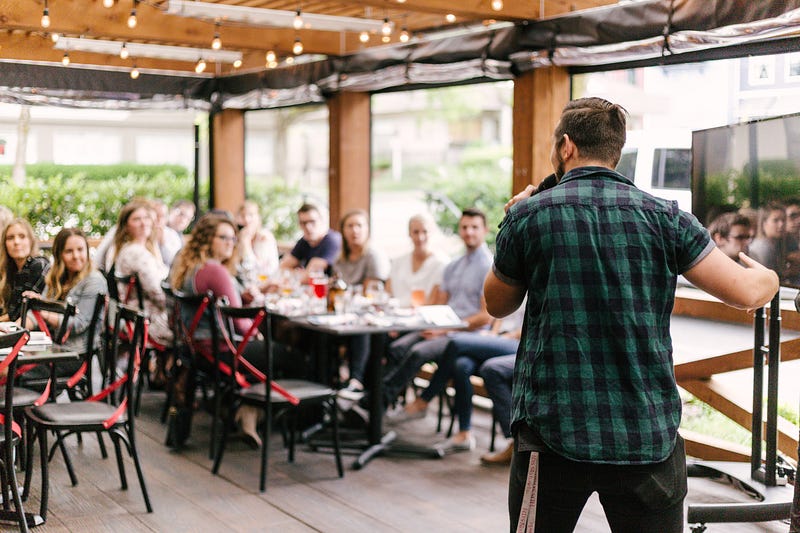Yeah dude, Toastmasters, I know right?
Really. In all seriousness, you need Toastmasters.

Primarily you need it because you end sentences with the “I know right?”
I needed, er, wanted it, because I knew I could be better. I was suffering from unconscious incompetence. Ego said one thing, actions, that I was blind to, spoke volumes contrary to the damn ego. A skunk cannot smell its own scent, they say.
Here are some of the things I have learned on my Toastmasters journey. I would suspect you have the same issues:
- I would umm, ahhh, tsk, and use verbal crutches anytime I would talk to somebody in senior leadership or when I would give a presentation to people in a group setting.
- I needed it because I would blend my words together and I would mumble or speak too fast for anyone to clearly understand me
- I did not enunciate while I would annunciate, nor was I able to articulate my narrative in a succinct manner.
- I was unable to or did not know how to modulate my voice volume correctly.
- I had no tone.
- I did not know how to present properly or professionally
- I was unable to stand comfortably in front of a group and share materials without the impostor syndrome taking over.
- I did not know how to stand and I would rock back and forth
- I did not know how to put my hands anywhere, let alone how to use my hands while presenting, often gesticulating incorrectly or wildly. I had an annoying habit of chopping and inserting imaginary things in the air with my right hand.
- I would pace. Or the complete opposite, I would freeze, like a statue
- I did not know how to listen
Even if you say “no, this is not how I am, I don’t need Toastmasters” I dare you to set up your phone or camera and video yourself the next time you speak in front of a crowd. Or better yet, just speak to yourself in front of the mirror (yet still record yourself). Watch it. You will see each and every one of those above behaviors.
Eerily uncomfortable.
You need to learn how to present. Learning how to present is what allows you to expand your career, to advance your career. You need to get better.

I am a recent Toastmasters convert. Additionally, I am currently the President of our local Club after holding the Secretary role prior. Hell yes, I drink the Kool-Aid.
However, for years I did not join Toastmasters. Nonetheless, I would put “Join local Toastmasters group” into my employee goals and reviews each year. I would tell my employees that they should consider Toastmasters in order to advance their careers. I held a myopic view that I was beyond needing to go to Toastmasters because I had already reached a managerial position within the organization without it. I “felt” I was reasonably comfortable talking to people in a public setting in a group setting.
However, that was a feeling. Hardly measurable.
About two years ago when I sat through my first Toastmaster introductory meeting to stand up a new club in the current organization I was with, I immediately realized how unpolished I was. Watching an experienced Toastmaster was eye and ear opening. I would stumble over my tongue, blend words together, and use verbal crutches in my efforts to speak in front of a group of people, and watching and listening to these mature Toastmasters speak was amazing. They were smooth, fluid, correct, and engaging.
Whoa! Reality check. I needed to learn how to enunciate correctly, I need to learn how to speak slowly. And I also needed to learn to be more concise and not drawl on for ages. And, above all else, I needed to learn how to present. Professionally.
If you talk to groups of people. If you have to present information. If you have to talk in front of your peers or management, you need Toastmasters. No matter how good you think you are, you need Toastmasters.
Check Your Ego at The Door
Look, I’m not going to lie, this is going to be a shock to you the first time you go and participate in your first Toastmasters. If you are bold enough in your first meeting as a visitor and volunteer to have the ah-counter click you every time you say ahh, um, or err, you better be ready. Good for you! I appreciate your enthusiasm, but I guarantee you will hate that ah-clicker and the person clicking the clicker in that first meeting, or second meeting, or even third meeting.
My suggestion would be to just have them silently count your crutches for the first few meetings and give you the results. When they click you, you will be extremely agitated by the time you are done with that meeting which may lead to you not wanting to return. Usually a series of excuses to not return — I don’t need this, I am too busy, I have to go to another meeting, etc.
No. YOU. NEED. THIS.

In addition, Toastmasters are going to tune your ear. Even after the first meeting you will be sitting in subsequent meetings outside of Toastmasters and realize how poorly most of our peers and leaders speak. You will stop focusing on the content of the meeting and laser in on the ums, ahs, and errs. It teaches you how to listen.
What is the purpose of Toastmasters? The purpose of Toastmasters is to improve yourself. To educate yourself. To advance your capability, improving your knowledge and polishing your presentation and communication skills. You do not do it because you are a masochist, and if you are, please keep that to yourself. But whatever gets you through that door, then go. And keep going.
Discipline.
You do it even if you think you are good or you really are good and you need to polish. Some of our senior Toastmasters are Distinguished Toastmasters (DTM) or multiple times a Distinguished Toastmaster. They go through it because they realize how important it is to be clear and concise and comfortable speaking in front of groups of people or presenting to leadership. They also do it to help pass on their experience and knowledge. To support the next generation of leaders.
Toastmasters skills you learn allows you to be a better communicator, but it will also teach you how to become a better leader.
Toastmasters club meetings have a very explicit and regimented agenda. Within that agenda, there are very distinct blocks of time for each of the functionary rolls to be performed, which includes measurements and scorekeeping, because, without measurement, you will not change behavior.
Reporting and feedback allowing people that speak during a Toastmaster session to become better due to immediate feedback. Timekeeping skills are imperative to leadership, and there is a formal time-keeper for all meetings to keep the meeting moving along promptly.
Keeping to an agenda and forcing a meeting to remain on time is extremely important for any business. All too often we get into meetings that are loose, freeform and quite messy and has little effectiveness when it comes to an overall meeting.
Toastmasters helps you understand how to make a proper agenda, including how to make appropriate time blocks for those particular roles or opportunities to speak and then provide feedback to each of those particular skills or reports.

The Toastmasters organization is global. If you want to compete locally or even internationally, you can do that. Most likely there is a Toastmasters club or even many Toastmasters clubs within a five-minute drive of your location. You may be lucky enough to have a Toastmasters club within your own organization. If you do, why are you not attending? For those where English is not their primary language, Toastmasters will help build your confidence and provide you with a safe place to practice your speaking and presenting skills.
Invest in your future. You are worth it.
Go forth and be brilliant.

Comments
Post a Comment